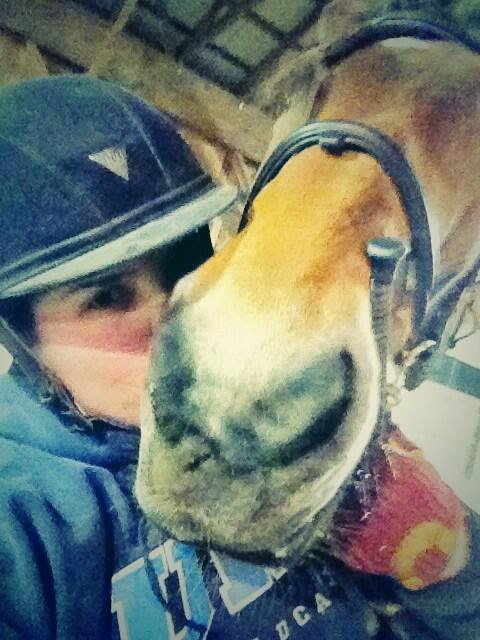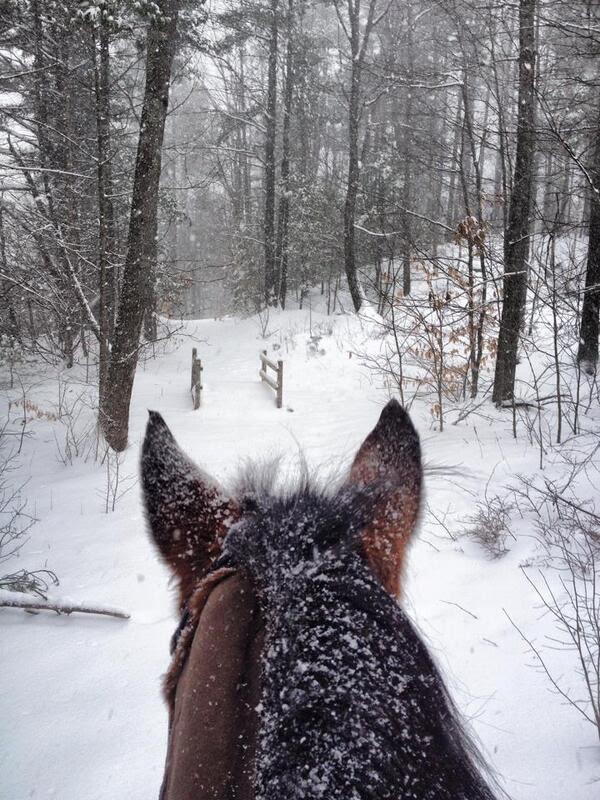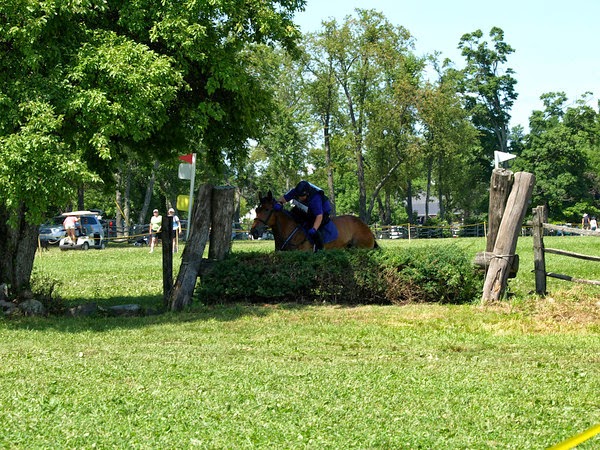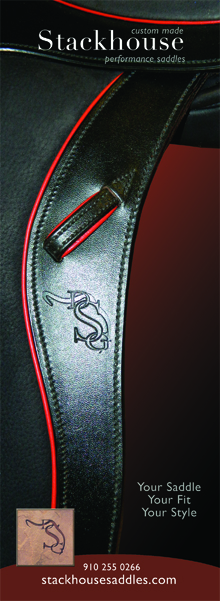Search the Site
Kirsten's Blog Post # 4
Before I even get into this topic I want to start off with a few ground rules. First, WEAR A FREAKING HELMET. Second, these are my personal opinions and thoughts, everyone is different. Third, please use common sense and air on the side of caution when it comes to the risk/presence of a concussion.

"survived the cold weather selfie" because a thing this winter at our barn... A and I were just tack walking, my helmet was on before she was even tacked up.
Alright, so we all know horseback riders are a special breed of Human. We choose to climb up on top of these massive animals with minds of their own and lets face it, if they really want to kill you, they can. End of story. So it goes without saying that because of this and because gravity is a pesky little annoyance we all fall off sometimes.
If you know me personally, you know I actually tend to fall off quite a bit. A lot of times when we are jumping because jumping is still so hard for me and my body to coordinate... It is easy for me to become unbalanced and just take a tumble.. Happens. And a LOT of the time because I forget that while my horse is a rock star, she is not actually a "bomb proof horse" and I do things like not work her for 2 weeks, take her out on a hack, bareback, in a halter, while talking on my phone/updating facebook, and something will startle her, she will jump or perform her patented sit & spin and I just go flying. Happens... Sometimes twice in one ride... I may be book smart people, but sometimes I am not so life smart....
 facebook NEEDED to know I was hacking!
facebook NEEDED to know I was hacking!
Anyways, we all fall off. Some fall more often than others, some are better at "sticking" (I have ZERO sticking ability), and some are just riding horses they really shouldn't be riding. But we can all agree it happens. Now, what do we do AFTER we fall off?
 This is what we can call a learning moment on not jumping ahead ;-)
This is what we can call a learning moment on not jumping ahead ;-)
I am a firm believer of the "Hospital or Back On" way of thinking. However, this is for me personally. As I said, generally when I come off (not for stupid Kirsten reasons) it is when something has happened when jumping. Now my confidence jumping is still something that is not all that rock solid. So when I come off, I take a few minutes to make sure everything is in working order, make sure my horse is okay, take a few deep breaths, and back on I go!
This HAS to happen for me... It just does! I over analyze EVERYTHING to do with my riding and my horse. I look at Event proofs and immediately start picking apart my position down to every single nitty gritty flaw. Jumped a clean stadium round? Bet you I'm not going to be happy with how I rode it... Low 30's in Dressage? I will probably be complaining about my transitions or how I let her get trucking around... Jumped clean XC but picked up time? I will re-ride that course time after time after time and pick apart each jump we chipped and didn't accelerate away from and each opportunity I missed to open her up a bit more.
So this is all well and good as far as my competitions go because I am a very competitive person so it helps me figure out what I need to work on for next time.... BUT after a fall, especially if it was a pretty nasty one, its so SO hard not to think about it.... Night... After Night.... After Night... Replaying it.... Time... After Time.... After Time.
However, what you can start doing when this happens is replay how you recovered from it. Replay how you got back on and did it again, and this time did it right. Maybe you lowered the jump, or simplified the exercise... but you got back on and you got the job done.
Ariat and I actually had a pretty nasty fall 2 summers ago that left me in pretty rough shape with some cracked ribs and other minor injuries. But after I caught my breath, made sure all the extremities were working as well as they can work when a 1500lb beast falls on you, and checked to make sure my tack wasn't broken, I was mounting back up and going at it. I then took care of Ariat, tucked her in for the night, started to drive home, and ended up calling my parents to tell them I was driving myself to the ER and to come meet me there. When I voluntarily go to the ER, you know something is wrong.
My cracked ribs were not immediately diagnosed and the following weekend I competed in a jumper show and also went hunter pacing with a friend. It was only the afternoon/evening of the hunterpace that my ribs really started to bother me and back to the Doctors I went the following day.
Now many many people told me to just scratch the jumper show and the hunter pace. Both were for fun, but we had just had a pretty rough fall, why push it?
For many people out there maybe it would not have been a big deal to just scratch the events and take some time to rest and heal a bit. But if I had done that, I would have gone into the winter off-season thinking about nothing but that fall. And it would have DESTROYED me as a rider. DESTROYED. Every shred of confidence I had built up from being terrified of x-rails to jumping Novice would have been lost.
Since then I have fallen probably too many times to count. As I said, I tend to come off quite a bit. But one fall this past season stands out to me the most. It was my last jump school leading up to Groton House, which was to be our biggest event to date. We were playing around with striding and Ariat's balance and we really were pushing for the correct striding (A can add strides for days but struggles with a longer spot), and the mare tripped, recovered, and jumped out of the line.... Meanwhile I'm up there trying so hard to stay on, and when she jumped out of the line my saddle finally rolled and off I came. Of course I was a little bit like, "How am I supposed to jump around Groton House when I just came off my horse over a 2'6" grid?!?!" But this is when it pays to ride with a trainer who KNOWS you and KNOWS your horse. I was allotted a minute to process it, and then back on I went, and back through that line we went. I was allowed to let her add through the line twice to get back into a rhythm, and then we were back to pushing for the correct striding.
This fall in particular taught me something about my horse. Ariat is a big girl and because she is a bit on her forehand she is a bit prone to tripping... Nothing terrible, but it's also not abnormal for her. However, before the line on the approach to the jump I was really messing with her face. I jump her in an elevator-type bit so I have some significant leverage in her mouth. That is there for the sole reason of helping to re-balance and sit her back on her bum after a gallop stretch on course, NOT for fighting with her 3 strides before the fence! My trainer and I discussed that when I get into it with her using my hands she only seems to pay attention to that and NOT where her feet are going, and THAT'S usually when she will take a funny stride or trip over the terrain.
This insight proved to be HUGE for us as on the Groton House xc course towards the start there is a log with a downhill landing and you gallop down a pretty significant hill into a longer gallop stretch, the last thing you want to do here is go too slow or else you will never ever make time on this course, BUT I was also concerned about Ariat tripping over herself. So instead of using my hands, we landed off that fence, I was in safety position down the hill, and then during the gallop stretch I didn't touch her mouth at all and just focused on keeping my center of gravity low and my shoulders back and letting her figure her balance out. It can be HARD to let go like that, but let me tell you, landing on your bum is a lot harder!
Falling off can be scary, but it is also a fact of life if we continue to ride these animals. I like to understand WHY a fall happens. The hardest thing to stomach is the fact that sometimes crap just happens! The rider and the horse can do their jobs to the best of their abilities, and yet, sometimes, things still hit the fan!
Riding instructors out there have the very difficult time of dealing with the liability of students getting concussions. As I have said, it is a fact of life that concussions and head injuries are a risk when it comes to riding horses. I've had my fair share of them as many riders I know have. Riders, use common sense. If you are picking yourself off the ground and feel and sign of concussion that is NOT the time you climb back on. Your riding instructor needs you to communicate with them. Know there is a difference between being shaken from just eating area footing and having a legit concussion. There is a difference from your body being sore from just first hand experiencing the force of gravity (we used to joke that all equine students should be passed through Physics automatically) and legitimate injury. Always air on the side of caution, but at the same time know your body, know your horse, and above all try to remain calm and communicate with your riding instructor.
As I have stated now many time horseback riding is not necessarily a safe sport. My mother would tell you IF she were to have gray hairs ever single one of them would be from my various falls, broken bones, concussions, and accidents. But there are ways to make it safe-er.
WEAR A HELMET. EVERY.SINGLE.TIME you SIT on your horse! I don't care if you are just hopping on for a bareback hack in the evening after work. HELMET! I don't care if it's not "cool" or if your hair won't look "good" after... Cause I'm here to tell you smushed brains is not an attractive look either.
Second, ride an appropriate horse. Your horse should challenge you, but in an appropriate way and you should not be afraid of riding your horse. If you are, get a different mount. That may sound crass, but what's the point of being terrified every single time you have to ride?
Third, ride with a qualified trainer who will push you and expand your comfort zone, but in a SAFE way.
And last, but not least, just keep learning and trying to get better. Be more secure, sink your heel just a bit further down, drop your shoulders down and back just that much more. Strengthen your core and "hunger" for that perfect equitation (yes all you Eventers out there, equitation is around for a REASON, our xc position would not pin in the hunter ring, but solid base of support is vital no matter what you ride). The more you learn and the stronger you become, the more you reduce your risk.
So if you have had a fall recently, I hope you are okay, I hope your horse is okay, and I hope you were able to hop back on, fix your mistakes, and are actively pursuing this sport. Because if I had given up that first summer when I seemed to keep popping off while learning how to jump, I would have never ever been able to know what it feels like to NAIL that perfect distance to a monster steeplechase fence with the best most dependable partner I could have ever asked for.

"survived the cold weather selfie" because a thing this winter at our barn... A and I were just tack walking, my helmet was on before she was even tacked up.
Alright, so we all know horseback riders are a special breed of Human. We choose to climb up on top of these massive animals with minds of their own and lets face it, if they really want to kill you, they can. End of story. So it goes without saying that because of this and because gravity is a pesky little annoyance we all fall off sometimes.
If you know me personally, you know I actually tend to fall off quite a bit. A lot of times when we are jumping because jumping is still so hard for me and my body to coordinate... It is easy for me to become unbalanced and just take a tumble.. Happens. And a LOT of the time because I forget that while my horse is a rock star, she is not actually a "bomb proof horse" and I do things like not work her for 2 weeks, take her out on a hack, bareback, in a halter, while talking on my phone/updating facebook, and something will startle her, she will jump or perform her patented sit & spin and I just go flying. Happens... Sometimes twice in one ride... I may be book smart people, but sometimes I am not so life smart....
 facebook NEEDED to know I was hacking!
facebook NEEDED to know I was hacking!Anyways, we all fall off. Some fall more often than others, some are better at "sticking" (I have ZERO sticking ability), and some are just riding horses they really shouldn't be riding. But we can all agree it happens. Now, what do we do AFTER we fall off?
 This is what we can call a learning moment on not jumping ahead ;-)
This is what we can call a learning moment on not jumping ahead ;-) I am a firm believer of the "Hospital or Back On" way of thinking. However, this is for me personally. As I said, generally when I come off (not for stupid Kirsten reasons) it is when something has happened when jumping. Now my confidence jumping is still something that is not all that rock solid. So when I come off, I take a few minutes to make sure everything is in working order, make sure my horse is okay, take a few deep breaths, and back on I go!
This HAS to happen for me... It just does! I over analyze EVERYTHING to do with my riding and my horse. I look at Event proofs and immediately start picking apart my position down to every single nitty gritty flaw. Jumped a clean stadium round? Bet you I'm not going to be happy with how I rode it... Low 30's in Dressage? I will probably be complaining about my transitions or how I let her get trucking around... Jumped clean XC but picked up time? I will re-ride that course time after time after time and pick apart each jump we chipped and didn't accelerate away from and each opportunity I missed to open her up a bit more.
So this is all well and good as far as my competitions go because I am a very competitive person so it helps me figure out what I need to work on for next time.... BUT after a fall, especially if it was a pretty nasty one, its so SO hard not to think about it.... Night... After Night.... After Night... Replaying it.... Time... After Time.... After Time.
However, what you can start doing when this happens is replay how you recovered from it. Replay how you got back on and did it again, and this time did it right. Maybe you lowered the jump, or simplified the exercise... but you got back on and you got the job done.
Ariat and I actually had a pretty nasty fall 2 summers ago that left me in pretty rough shape with some cracked ribs and other minor injuries. But after I caught my breath, made sure all the extremities were working as well as they can work when a 1500lb beast falls on you, and checked to make sure my tack wasn't broken, I was mounting back up and going at it. I then took care of Ariat, tucked her in for the night, started to drive home, and ended up calling my parents to tell them I was driving myself to the ER and to come meet me there. When I voluntarily go to the ER, you know something is wrong.
My cracked ribs were not immediately diagnosed and the following weekend I competed in a jumper show and also went hunter pacing with a friend. It was only the afternoon/evening of the hunterpace that my ribs really started to bother me and back to the Doctors I went the following day.
Now many many people told me to just scratch the jumper show and the hunter pace. Both were for fun, but we had just had a pretty rough fall, why push it?
For many people out there maybe it would not have been a big deal to just scratch the events and take some time to rest and heal a bit. But if I had done that, I would have gone into the winter off-season thinking about nothing but that fall. And it would have DESTROYED me as a rider. DESTROYED. Every shred of confidence I had built up from being terrified of x-rails to jumping Novice would have been lost.
Since then I have fallen probably too many times to count. As I said, I tend to come off quite a bit. But one fall this past season stands out to me the most. It was my last jump school leading up to Groton House, which was to be our biggest event to date. We were playing around with striding and Ariat's balance and we really were pushing for the correct striding (A can add strides for days but struggles with a longer spot), and the mare tripped, recovered, and jumped out of the line.... Meanwhile I'm up there trying so hard to stay on, and when she jumped out of the line my saddle finally rolled and off I came. Of course I was a little bit like, "How am I supposed to jump around Groton House when I just came off my horse over a 2'6" grid?!?!" But this is when it pays to ride with a trainer who KNOWS you and KNOWS your horse. I was allotted a minute to process it, and then back on I went, and back through that line we went. I was allowed to let her add through the line twice to get back into a rhythm, and then we were back to pushing for the correct striding.
This fall in particular taught me something about my horse. Ariat is a big girl and because she is a bit on her forehand she is a bit prone to tripping... Nothing terrible, but it's also not abnormal for her. However, before the line on the approach to the jump I was really messing with her face. I jump her in an elevator-type bit so I have some significant leverage in her mouth. That is there for the sole reason of helping to re-balance and sit her back on her bum after a gallop stretch on course, NOT for fighting with her 3 strides before the fence! My trainer and I discussed that when I get into it with her using my hands she only seems to pay attention to that and NOT where her feet are going, and THAT'S usually when she will take a funny stride or trip over the terrain.
This insight proved to be HUGE for us as on the Groton House xc course towards the start there is a log with a downhill landing and you gallop down a pretty significant hill into a longer gallop stretch, the last thing you want to do here is go too slow or else you will never ever make time on this course, BUT I was also concerned about Ariat tripping over herself. So instead of using my hands, we landed off that fence, I was in safety position down the hill, and then during the gallop stretch I didn't touch her mouth at all and just focused on keeping my center of gravity low and my shoulders back and letting her figure her balance out. It can be HARD to let go like that, but let me tell you, landing on your bum is a lot harder!
Falling off can be scary, but it is also a fact of life if we continue to ride these animals. I like to understand WHY a fall happens. The hardest thing to stomach is the fact that sometimes crap just happens! The rider and the horse can do their jobs to the best of their abilities, and yet, sometimes, things still hit the fan!
Riding instructors out there have the very difficult time of dealing with the liability of students getting concussions. As I have said, it is a fact of life that concussions and head injuries are a risk when it comes to riding horses. I've had my fair share of them as many riders I know have. Riders, use common sense. If you are picking yourself off the ground and feel and sign of concussion that is NOT the time you climb back on. Your riding instructor needs you to communicate with them. Know there is a difference between being shaken from just eating area footing and having a legit concussion. There is a difference from your body being sore from just first hand experiencing the force of gravity (we used to joke that all equine students should be passed through Physics automatically) and legitimate injury. Always air on the side of caution, but at the same time know your body, know your horse, and above all try to remain calm and communicate with your riding instructor.
As I have stated now many time horseback riding is not necessarily a safe sport. My mother would tell you IF she were to have gray hairs ever single one of them would be from my various falls, broken bones, concussions, and accidents. But there are ways to make it safe-er.
WEAR A HELMET. EVERY.SINGLE.TIME you SIT on your horse! I don't care if you are just hopping on for a bareback hack in the evening after work. HELMET! I don't care if it's not "cool" or if your hair won't look "good" after... Cause I'm here to tell you smushed brains is not an attractive look either.
Second, ride an appropriate horse. Your horse should challenge you, but in an appropriate way and you should not be afraid of riding your horse. If you are, get a different mount. That may sound crass, but what's the point of being terrified every single time you have to ride?
Third, ride with a qualified trainer who will push you and expand your comfort zone, but in a SAFE way.
And last, but not least, just keep learning and trying to get better. Be more secure, sink your heel just a bit further down, drop your shoulders down and back just that much more. Strengthen your core and "hunger" for that perfect equitation (yes all you Eventers out there, equitation is around for a REASON, our xc position would not pin in the hunter ring, but solid base of support is vital no matter what you ride). The more you learn and the stronger you become, the more you reduce your risk.
So if you have had a fall recently, I hope you are okay, I hope your horse is okay, and I hope you were able to hop back on, fix your mistakes, and are actively pursuing this sport. Because if I had given up that first summer when I seemed to keep popping off while learning how to jump, I would have never ever been able to know what it feels like to NAIL that perfect distance to a monster steeplechase fence with the best most dependable partner I could have ever asked for.






